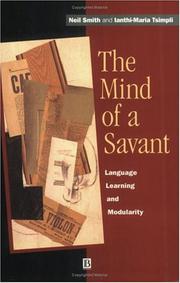| Listing 1 - 3 of 3 |
Sort by
|

ISBN: 0631190171 Year: 1995 Publisher: Oxford Blackwell
Abstract | Keywords | Export | Availability | Bookmark
 Loading...
Loading...Choose an application
- Reference Manager
- EndNote
- RefWorks (Direct export to RefWorks)
Psycholinguistics --- Psycholinguïstiek --- Tweede-taalverwerving --- Vreemdetalenonderwijs --- didactiek --- Psycholinguïstiek. --- Tweede-taalverwerving. --- didactiek. --- Language and languages --- Modularity (Psychology) --- Savants (Savant syndrome) --- Second language acquisition --- Faculty psychology --- Modules (Psychology) --- Human information processing --- Second language learning --- Language acquisition --- Idiot savants --- Gifted persons --- People with mental disabilities --- Language, Psychology of --- Psychology of language --- Speech --- Linguistics --- Psychology --- Thought and thinking --- Foreign languages --- Languages --- Anthropology --- Communication --- Ethnology --- Information theory --- Meaning (Psychology) --- Philology --- Study and teaching&delete& --- Case studies --- Psychological aspects --- Study and teaching
Book
ISBN: 9789027249326 9027249326 9789027214294 Year: 2023 Publisher: Amsterdam John Benjamins Publishing Company
Abstract | Keywords | Export | Availability | Bookmark
 Loading...
Loading...Choose an application
- Reference Manager
- EndNote
- RefWorks (Direct export to RefWorks)
"The thematic volume 'Individual differences in anaphora resolution: Language and cognitive effects' was initially inspired by a workshop on anaphora organized by the 'Language Development Lab', School of English, Aristotle University and hosted in Thessaloniki in May 2015. 'Individual differences in anaphora resolution: Language and cognitive effects' explores anaphora resolution from different perspectives, and investigates various aspects of the phenomenon, as contributions include research protocols that combine old and new experimental methodologies as well as theoretical and empirical approaches. A central theme across volume contributions are the multiple linguistic and extralinguistic factors that constrain anaphora resolution, its processing and acquisition by a variety of populations (children and adults, monolinguals, bilinguals and second language learners) as well as the mechanisms underlying anaphora resolution. Anaphora resolution constitutes an ideal environment to test the interaction between domain-general cognitive systems and domain-specific linguistic sub-routines, since variability in referential preferences is not related to binding constraints (an integral part of syntax per se) but is closely tied to processing (functional constraints) modulated by the integration of discourse-filtered information"--
Book
Abstract | Keywords | Export | Availability | Bookmark
 Loading...
Loading...Choose an application
- Reference Manager
- EndNote
- RefWorks (Direct export to RefWorks)
| Listing 1 - 3 of 3 |
Sort by
|

 Search
Search Feedback
Feedback About UniCat
About UniCat  Help
Help News
News